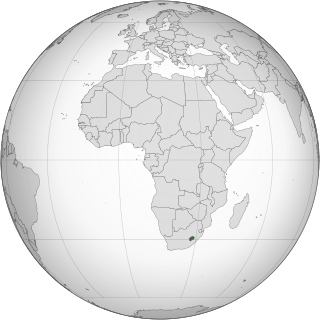Related Research Articles
Marriage, also called matrimony or wedlock, is a culturally and often legally recognised union between people called spouses. It establishes rights and obligations between them, as well as between them and their children, and between them and their in-laws. It is nearly a cultural universal, but the definition of marriage varies between cultures and religions, and over time. Typically, it is an institution in which interpersonal relationships, usually sexual, are acknowledged or sanctioned. In some cultures, marriage is recommended or considered to be compulsory before pursuing sexual activity. A marriage ceremony is called a wedding, while a private marriage is sometimes called an elopement.
When a person assumes the family name of their spouse, in some countries that name replaces the person's previous surname, which in the case of the wife is called the maiden name, whereas a married name is a family name or surname adopted upon marriage.
Same-sex marriage, also known as gay marriage, is the marriage of two people of the same legal sex. As of 2024, marriage between same-sex couples is legally performed and recognized in 36 countries, with a total population of 1.5 billion people. The most recent country to legalise same-sex marriage is Greece. Two more countries, Liechtenstein and Thailand, are set to begin performing same-sex marriages in late 2024 or in early 2025.
Common-law marriage, also known as non-ceremonial marriage, sui iuris marriage, informal marriage, de facto marriage, or marriage by habit and repute, is a marriage that results from the parties' agreement to consider themselves married and subsequent cohabitation, rather than through a statutorily defined process. Not all jurisdictions permit common law marriage, but will typically respect the validity of such a marriage lawfully entered in another state or country.

A civil marriage is a marriage performed, recorded, and recognized by a government official. Such a marriage may be performed by a religious body and recognized by the state, or it may be entirely secular.
A domestic partnership is an intimate relationship between people, usually couples, who live together and share a common domestic life but who are not married. People in domestic partnerships receive legal benefits that guarantee right of survivorship, hospital visitation, and other rights.

The availability of legally recognized same-sex marriage in the United States expanded from one state (Massachusetts) in 2004 to all fifty states in 2015 through various court rulings, state legislation, and direct popular votes. States each have separate marriage laws, which must adhere to rulings by the Supreme Court of the United States that recognize marriage as a fundamental right guaranteed by both the Due Process Clause and the Equal Protection Clause of the Fourteenth Amendment to the United States Constitution, as first established in the 1967 landmark civil rights case of Loving v. Virginia.
A marriage license is a document issued, either by a religious organization or state authority, authorizing a couple to marry. The procedure for obtaining a license varies between jurisdictions, and has changed over time. Marriage licenses began to be issued in the Middle Ages, to permit a marriage which would otherwise be illegal.
A proxy wedding or proxy marriage is a wedding in which one or both of the individuals being united are not physically present, usually being represented instead by other persons (proxies). If both partners are absent, this is known as a double proxy wedding.
Conflict of marriage laws is the conflict of laws with respect to marriage in different jurisdictions. When marriage-related issues arise between couples with diverse backgrounds, questions as to which legal systems and norms should be applied to the relationship naturally follow with various potentially applicable systems frequently conflicting with one another.

Marriage law is the legal requirements, an aspect of family law, that determine the validity of a marriage, and which vary considerably among countries in terms of what can and cannot be legally recognized by the state.

The legal status of same-sex marriage has changed in recent years in numerous jurisdictions around the world. The current trends and consensus of political authorities and religions throughout the world are summarized in this article.

This article summarizes the same-sex marriage laws of states in the United States. Via the case Obergefell v. Hodges on June 26, 2015, the Supreme Court of the United States legalized same-sex marriage in a decision that applies nationwide, with the exception of American Samoa and sovereign tribal nations.
The extension of civil marriage, union, and domestic partnership rights to same-sex couples in various jurisdictions can raise legal issues upon dissolution of these unions that are not experienced by opposite-sex couples, especially if law of their residence or nationality does not have same-sex marriage or partnerships.

Lesbian, gay, bisexual, and transgender (LGBT) people in Lesotho face legal challenges not experienced by non-LGBT residents. Lesotho does not recognise same-sex marriages or civil unions, nor does it ban discrimination on the basis of sexual orientation or gender identity.

Under civil law, Nigeria does not recognize polygamous unions. However, 12 out of the 36 Nigerian states recognize polygamous marriages as being equivalent to monogamous marriages. All twelve states are governed by Sharia law. The states, which are all northern, include the states of Bauchi, Borno, Gombe, Jigawa, Kaduna, Kano, Katsina, Kebbi, Niger, Sokoto, Yobe, and Zamfara which allows for a man to take more than one wife.
Bulgaria does not recognize same-sex marriage or civil unions. Though these issues have been discussed frequently over the past few years, no law on the matter has passed the National Assembly. In September 2023, the European Court of Human Rights ordered the government to establish a legal framework recognizing same-sex unions.
The legal status of polygamy varies widely around the world. Polygyny is legal in 58 out of nearly 200 sovereign states, the vast majority of them being Muslim-majority countries. Some countries that permit polygamy have restrictions, such as requiring the first wife to give her consent.
The Supreme Court decision in Obergefell v. Hodges that legalized same-sex marriage in the states and most territories did not legalize same-sex marriage on Indian reservations. In the United States, Congress has legal authority over tribal reservations. Thus, unless Congress passes a law regarding same-sex marriage that is applicable to tribal governments, federally recognized American Indian tribes have the legal right to form their own marriage laws. As such, the individual laws of the various United States federally recognized Native American tribes may set limits on same-sex marriage under their jurisdictions. At least ten reservations specifically prohibit same-sex marriage and do not recognize same-sex marriages performed in other jurisdictions; these reservations remain the only parts of the United States to enforce explicit bans on same-sex couples marrying.

Basotho nationality law is regulated by the Constitution of Lesotho, as amended; the Lesotho Citizenship Order, and its revisions; the 1983 Refugees Act; and various international agreements to which the country is a signatory. These laws determine who is, or is eligible to be, a national of Lesotho. The legal means to acquire nationality, formal legal membership in a nation, differ from the domestic relationship of rights and obligations between a national and the nation, known as citizenship. Nationality describes the relationship of an individual to the state under international law, whereas citizenship is the domestic relationship of an individual within the nation. In Britain and thus the Commonwealth of Nations, though the terms are often used synonymously outside of law, they are governed by different statutes and regulated by different authorities. Basotho nationality is typically obtained under the principle of jus soli, born in Lesotho, or jus sanguinis, i.e. by birth in Lesotho or abroad to parents with Basotho nationality. It can be granted to persons with an affiliation to the country, or to a permanent resident who has lived in the country for a given period of time through naturalisation.
References
- ↑ Lesotho: Family Code
- ↑ "Error" (PDF).